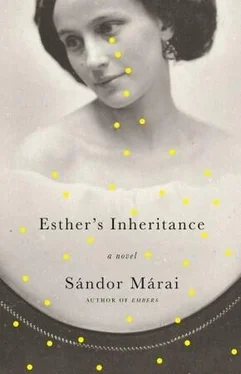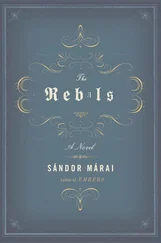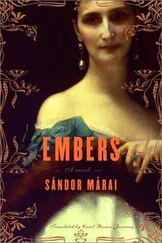Even now he was looking at Lajos like someone who knows everything but feels no temptation either to judge or excuse him. The phrase “So, Lajos,” with which, after twenty years, he greeted him, was not exactly condescending, not proud or severe, and yet I saw how the words discomposed Lajos, how he was glancing around nervously, in a funk, wiping his brow with a handkerchief. They talked together about politics and about the funeral. Then Endre, having seen and heard enough, gave a shrug, sat down on the bench, and crossed his hands over his belly, old-gentleman fashion. The day was well into the late afternoon, and once he had checked the deeds by which I empowered Lajos to sell the house, he had nothing more to say to anyone.
Naturally, we were all aware that Lajos wanted my life, or, more precisely, Nunu’s life, that he wanted to rob me of my peace. The house was still there providing a roof above our heads, a little battered by time but, despite everything, still fortress-like: the house was the last object of value we possessed that Lajos had not yet taken away, and now he had come for it. The moment I received the telegram I knew he was after the house; one doesn’t think such things in words, one just knows. I carried on deceiving myself to the last. Endre knew, so did Tibor. Later we were astonished at how cheaply and easily we surrendered to Lajos and accepted the fact that in life there are no halfway solutions, and the process having begun fifteen years ago simply had to be finished. Lajos knew it too. He had established that the house was a touch damp and having done so immediately talked about something else, as if the most important part of his business was concluded and there was no point wasting words on details. Tibor and Laci stood by inquisitively. Sometime later, before dinner, a tailor arrived, Lajos’s old tailor, and bowing and scraping in embarrassment handed over a twenty-five-year-old bill. Lajos embraced him and sent him away. The gentlemen drank vermouth, talked in loud voices, and laughed a great deal at Lajos’s anecdotes. We sat down to dinner in an excellent mood.
T he only thing I couldn’t understand was what the strange woman was doing here. She was too old and plainly dressed to be Lajos’s lover. It took me a while to understand that the young man in the leather coat who had been the first to get out of the red car, who had mumbled a few courtesies of greeting and then said nothing the rest of the time, communicating only with his lion-headed dog, was the woman’s son. There was something contrary to our agreement here. The young man was blond, light blond, a kind of silvery blond; it was as if his face were naked, his eyelashes almost invisible against the pale skin. He was constantly blinking. His hair was curly and woolly in texture like an old African’s. Later he put on a pair of dark blue glasses and practically disappeared behind the dark lenses. It was only toward evening that I discovered that this young man was Éva’s fiancé and that the woman, a rather respectable sort of woman who tended to mix badly pronounced French words in her conversation, had for years been Lajos’s housekeeper. I understood nothing of this in the confusion of the first few hours.
The woman, whom the children addressed as Olga, was, if anything, rather melancholy and embarrassed. She made no effort to press her company on us and, after the introductions, sat quietly at the breakfast table fiddling with her parasol and gazing at her plate. I took her for an adventuress at first. But my later impression was that if she was an adventuress she was a tired and ill-tempered one, someone who no longer believed in the adventure and would happily give it all up to settle in some quiet occupation like crochet or embroidery. Occasionally she gave a bitter smile that bared her yellow, masculine teeth. When I came face-to-face with her I didn’t know what to say. We took stock of each other, smiling at first then without smiles, with hard looks and undisguised suspicion. A cloud of sweetish perfume billowed from her dress and painted yellow hair.
“Dear Esther,” she said.
I resisted the intimacy and loudly answered:
“Madam.”
I laughed. The house was all but dissolving in those hours before lunch, becoming no more than a splendid mirage. Doors were slamming. Lajos took out a box from which he produced a tortoise and was demonstrating how it responded to music, moving when he whistled, sticking out its wrinkled neck and making a hissing noise by way of communication. He had brought the creature with him as a conversation piece, an accessory, as evidence of his triumph as a genius animal trainer. The tortoise was a great success. We all stood around enthusing about Lajos’s performance, and even the solemn Endre succumbed to his curiosity.
Lajos went on to distribute presents: a wristwatch for Laci, two rare French editions of poetry, bound in leather, for Nunu (he had garnished the gift with a presentation verse of his own, indifferent to the fact that Nunu couldn’t read French), Tibor and Endre received expensive foreign cigars, and I got a lilac silk shawl. The excitement was general, constantly at boiling point. There were strangers gawping over the fence, so we retreated into the house. The house was filling up with the aroma of hot seasoned food that always carries an immemorial sense of the simple delights of life along with something of its haste, conjuring the tinkle of cutlery, the slamming of doors, the clatter of plates, the distant chatter of arriving guests, faint childish screams, all amounting to some physical or musical fanfare to declare that life was a miracle to be celebrated! Which was exactly what I saw whatever way I turned. The unknown woman sat down in a corner and talked in a flat voice.
She told me how she had first met Lajos eight years before when she left her husband. Her son worked in an office; she did not say precisely where or what kind. I had never in my life seen people like the woman and her son at close quarters. I had leafed through magazines where there were photographs of what the young were up to, or a species of youth, the kind of people who danced in jackets with padded shoulders in the lobbies of hotels or flew airplanes or dashed off somewhere on a motorcycle with young women whose skirts fluttered above the knee on the pillion seat. I am of course aware that there is another species of the young who are perfectly real people. The former is just my caricature of unnerving aliens of whom I know next to nothing but who live on in my memory and imagination. All I know is that they are no longer anything to do with me. Beyond the confusion, beyond my ignorance, when I am in their presence I know that I have no means of communicating with them; they are the species of motoring and dancing humanity I see on movie screens, who are not included in the contract my parents and I had established with society.
There was something unusual about the boy; he might have been the hero of a novel, most likely a detective story. He said little, and when he spoke he stared at the ceiling and pronounced each syllable distinctly, almost singing the words. He was as melancholy as his mother; both exuded a dreary sadness. I had never before been with people who were so insultingly, so brazenly alien. He didn’t smoke, he didn’t drink. He wore a thin gold bracelet on his left wrist. Sometimes he raised his hand so suddenly it looked as though he wanted to hit someone; then, with a stiff mechanical movement, he would push the bracelet farther up his arm. I discovered he had not long passed thirty and was a secretary of some sort at the headquarters of one of the political parties, but when he took off his dark blue glasses and surveyed the people and objects in the room his watery eyes made him look even older than Lajos.
Читать дальше












